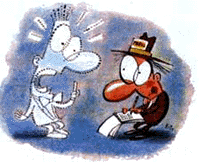
John Leo
http://www.jewishworldreview.com -- WHY DO SO MANY AMERICANS distrust what they in read in their newspapers? The American Society of Newspaper Editors, which met last week in Washington, is trying to answer this painful question. The organization is deep into a long self-analysis known as the Journalism Credibility Project. Sad to say, this project has turned out to be mostly low-level dithering about factual errors and spelling and grammar mistakes, combined with lots of head-scratching puzzlement about what in the world those darned readers really want.
But the sources of distrust go way deeper. For a better focus, ASNE might want to listen to columnist Michael Kelly and Peter Brown, an editor at The Orlando (Fla.) Sentinel. Kelly writes, almost casually, that "most journalists learn to see the world through a set of standard templates into which they plug each days's events." In other words, there is a conventional story line in the newsroom culture that provides a backbone and a ready-made narrative structure for otherwise confusing news.
Peter Brown's work finds a social and cultural disconnect between journalists and their readers. It also helps explain why the "standard templates" of the newsroom seem alien to many readers. With the help of a professional pollster, Brown sent questionnaires to reporters in five middle-sized cities around the country, plus one large metropolitan area, Dallas-Fort Worth. Then residents in these communities were phoned at random and asked the same questions.
Replies show that compared with other Americans, journalists are more likely to live in upscale neighborhoods, have maids, own Mercedes and trade stocks, and less likely to go to church, do volunteer work or put down roots in a community. Journalists are overrepresented in ZIP code areas where residents are twice as likely as other Americans to rent foreign movies, drink chablis, own an espresso maker, and read magazines such as Architectural Digest and Food & Wine.
Remember, these aren't reporters for The New York Times or The Washington Post. The gap is between reporters and their neighbors in Dayton, Ohio; Tulsa, Okla.; Syracuse, N.Y.; Roanoke, Va.; and Chico/Redding, Calif., plus Dallas and Fort Worth.
Brown found that the disconnect carries over to social attitudes: Journalists are far more likely than other Americans to approve of abortion, to express disdainful attitudes toward suburbs and rural areas, and to identify strongly with people who see themselves as victims of society.
 |
This is an explosive situation for any industry, particularly a declining one. Here is a troubled business that keeps hiring employees whose attitudes vastly annoy the customers. Then it sponsors lots of symposiums and a credibility project dedicated to wondering why customers are annoyed and fleeing in large numbers. But it never seems to get around to noticing the cultural and class biases that so many former buyers are complaining about. If it did, it would open up its diversity program, now focused narrowly on race and gender, and look for reporters who differ broadly by outlook, values, education and class.
The values of accountants and plumbers don't matter much to customers, but those of reporters are crucial. They determine which stories are selected and omitted, and how important the stories will feel to readers. The brutal torture-murder of Matthew Shepard was a big story and deserved to be. But shortly after, two homosexuals were charged with committing a crime just as horrendous -- kidnaping, torturing and murdering a young Arkansas boy -- with almost no national media coverage at all. Probable explanation: This was another "standard template" in action; in the newswoom culture, important and newsworthy violence is the kind conducted by the powerful (whites, straights, males, the West) against members of groups considered weak. Since the boy's murder didn't fit the template, it had no symbolic value and went unreported.
The same filter applies to good news. After racial preferences were ended at state universities in California and Texas, the numbers of blacks and Hispanics attending these colleges dipped briefly, then rebounded to the old levels. Great news if you could find it. But it didn't fit the relevant newsroom story line -- that racial justice absolutely requires preference programs -- so the story was widely delayed, omitted or stuffed way back in the paper.
These are the distortions to expect when the newsroom comes to look
like a monoculture. It's time to try some
JWR contributor John Leo's latest book is Two Steps Ahead of the Thought Police. Send your comments by clicking here.
04/05/00: Census sense and nonsense
03/29/00: Hollywood message films leave no room for other views
03/22/00: The Vatican confesses, but is it enough?
03/14/00: Watch what you say: The left can no longer be counted on to defend free speech
03/07/00: McCain's malleable messages
03/01/00: Bush's appearance at Bob Jones U. will dog him all the way
02/23/00: 'Multi-millionaire' show is new evidence we're insane

